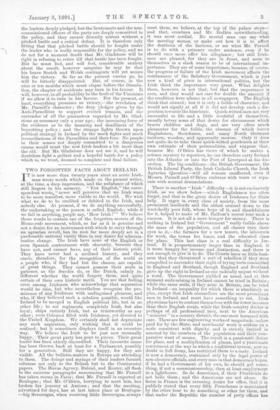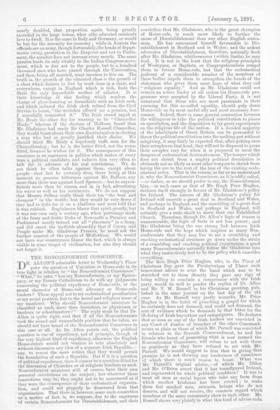TWO FORGOTTEN FACTS ABOUT IRELAND.
IT is now more than twenty years since an acute Irish- man wrote words which made on the present writer, at the time, a deep impression, and the substance of which still lingers in his memory. "You English," the corre- spondent wrote, "never will perceive that we Irish want to be more manifest, more visible to the world. We wish what we do to be credited or debited to the Irish, and nobody else. At present, if we do anything successfully, the undertaking or the person is called. English ; while if we fail in anything, people say, How Irish !' " We believe those words to contain one of the forgotten secrets of the Home-rule movement, which, so far as it is genuine and not a desire for an instrument with which to carry through an agrarian revolt, has its root far more deeply set in a pardonable national vanity than in any desire for adminis- trative change. The Irish have none of the English or even Spanish contentment with obscurity, because they have not, and cannot have, any of their historic pride. They have never had a civilised history, and they crave, therefore, for the recognition of the world as a people who, if they had but the chance, are capable of great things. They cannot possess their souls in patience, as the Swedes do, or the Dutch, calmly in- different whether the world forgets them, and quite certain of their own historic merit. You see that feeling even among Irishmen who acknowledge that separation would be ruin, but who nevertheless recognise the pro- minence of any Irishman with undisguised pleasure, and who, if they believed such a solution possible, would like Ireland to be merged in English political life, but in no other life ; to see regiments completely Irish, but also loyal ; ships entirely Irish, but as trustworthy as any other ; even Colonies filled with Irishmen, yet devoted to the United Kingdom. We certainly shall not depreciate any such aspiration, only wishing that it could be realised ; but it sometimes displays itself in an eccentric way. We believe the Irish to be just now unusually happy. Their great party has gone to pieces. Their great leader has been utterly discredited. Their favourite cause has been thrown back at least for a Parliament, possibly for a generation. Still they are happy, for they are visible. All the bulletin-makers in Europe are attending to them. The doings and sayings of their leaders furnish columns not only to the British but to the Continental papers. The Havas Agency, Dalziel, and Reuter, all flash to the universe paragraphs announcing that Mr. Parnell has taken rooms in Paris ; that Mr. Parnell is expected at Boulogne ; that Mr. O'Brien, hurrying to meet him, has broken his journey at Amiens ; and that the meeting, advertised for days, has at last taken place at Boulogne —big Sovereigns, when receiving little Sovereigns, always meet them, we believe, at the top of the palace steps— and that, crowbars and Mr. Bodkin notwithstanding, it was most cordial. No mortal man can say what the meeting means, or make out how it is to affect the destinies of the factions, or see what Mr. Parnell is to do with a prisoner under sentence, even if he should once more offer his allegiance ; but still Irish- men are pleased, for they are in front, and seem to themselves in a slack season to be of international im- portance. They are of some importance, because, of course,. the progress or failure of the Irish movement affects the continuance of the Salisbury Government, which is just now a kind of pivot in international politics, but the Irish think the importance very great. What delights them, however, is not that, but that the importance is seen, and they would not care for double the amount if the condition were silence in all newspapers. The English think that absurd ; but it is only a foible of character, and would not signify at all if it did not develop such a dis- position towards the histrionic. Quick-witted men not very successful in life and a little doubtful of themselves,. usually betray some of that desire for obviousness which besets children and dogs, and are very often much pleasanter for the foible, the absence of which leaves Englishmen, Scotchmen, and many North Germans taciturn, wooden, and apparently morose. Only it does not quite do to take these quick-witted gentlemen at their own estimate of their personalities, and suppose that, because Mr. O'Brien has views of which he makes a solemn mystery to reporters, he can therefore carry Ireland into the Atlantic or into the Port of Liverpool at his dis- cretion. The big conditions—the British Government, the British Liberal Party, the Irish Catholic Church, the Irish Agrarian Question—will all remain unaffected, even if Messrs. Parnell and O'Brien embrace with tears or sepa- rate with mutual denunciations.
There is another " Irish " difficulty—it is not exclusively Irish, as we show below—which Englishmen too often forget, and that is the great desire of Irishmen for State help. It rages in every class of society, from the most prominent landlords and the ablest counsel down to the wretchedly poor folk, whose hope of it, and thankfulness for it, helped to make of Mr. Balfour's recent tour such a success. It is not' all a mere hunger for money. There is nothing in Ireland but " Government " really visible above the mass of the population, and all classes turn their eyes to it,—the farmers for a new tenure, the labourers for work, the towns for loans, and the educated class for place. This last class is a real difficulty in Ire- land. It is proportionately larger than in England, it is more hungry for income and distinction, and there is not enough to give it to do. The Courts have so little busi- ness that they threatened a sort of rebellion if they were compelled to surrender their right of trying torts committed in England and Scotland, though England and. Scotland, gave up the right in Ireland as one radically unjust without a word. The Government yielded as usual, and at this.. momentsuits arising in Ireland cannot be tried in Britain ; while the same suits, if they arise in Britain, can be tried in Ireland—an inequality for which there is absolutely no plea, except that Irish counsellors are the most prominent men in Ireland, and must have something to eat. Irish physicians have to content themselves with far lower incomes. than their English rivals, while the Irish country doctor is perhaps of all professional men, next to the American " minister in a country district, the one most harassed with care. There are few engineering works of magnitude, unless paid for by the State, and merchants' work is seldom on a scale consistent with dignity, and is strictly limited in amount by the numbers of the population and their com- parative want of means. The result is a passionate desire for place, and a multiplication of places, and a passionate resentment at the way in which a traditional system, now no doubt in full decay, has restricted them to a caste. Ireland is now a democracy, restrained only by the legal power of non-elective officials, and every man in that democracy hopes, if he had a Government of his own, he should get some-. thing, if not a commissionership, then at least employment in a lighthouse. So do Americans, if their Presidents do- not belie them ; and the Americans are not alone. So fierce in France is the ravening desire for office, that it is publicly stated that every fifth Frenchman is maintained by the other four to do something or other for them, and that under the Republic the number of petty offices has nearly doubled, that proportion again being greatly exceeded in the large towns, wher ethe educated esurients love to dwell. It is the same in Italy and Germany, or would he but for the necessity for economy ; while in Austria the officials are an army, though fortunately, the heads of depart- ments owing promotion to the Emperor and not to Parlia- 2nent, the numbet does not increase every month. The same passion lends its only vitality to the Indian Congress move- ment, which is due not to the people, but to a hundred thousand men who have passed through the Universities, and then, being all married, want incomes to live on. The truth is, the growth of the educated class is the growth of a class which desires to live by work done in a chair, and everywhere, except in England which is rich, finds the State the only dependable mother of salaries. It is their knowledge of this feeling which renders the charge of place-hunting so formidable with an Irish mob, and which induced the Irish clerk retired from the Civil Service to boast, "the wretches offered me a pension, but scornfully commuted it." The Irish crowd raged at Mr. Healy the other day for wanting to be "Chancellor Healy," whereas if the electors of Holborn heard that Mr. Gladstone had made Sir Charles Russell Chancellor, they would boast about their own discrimination in electing a man who had, so greatly justified their choice. We .should think Mr. Healy a hopelessly unfit man for the Chancellorship ; but he is the better fitted, not the worse fitted,' because he wishes for it. The consequence of this esurience is an eagerness in politics which makes of every man a political candidate, and induces him very often to talk far in advance of his real convictions. We do not think he often talks against them, except about people—that last he certainly does, there being at this moment no genuine bitterness against Mr. Balfour, any 'more than there was against Lord Spencer,—but he says in- finitely more than he means, and is, iu fact, advertising his wares as well as his sentiments. We do not suppose that Messrs. Selltea really think their tea "the best and .cheapest " in the world ; but .they would be very fierce if they had to fight for it on a platform and were told that it was rubbish. Englishmen blame that spirit greatly, but it was our own only a century ago, when patronage raade of the fussy and feeble Duke of Newcastle a Premier, and Parliament nearly turned out all " plaeemen" in a lump, and did enact the ineffable absurdity that if Crown and People make Mr. Gladstone Premier, he must ask the further consent of the people of Midlothian. We would not have our countrymen blame the fact, which is always visible in some stages of civilisation, but also they should not forget it.















































 Previous page
Previous page